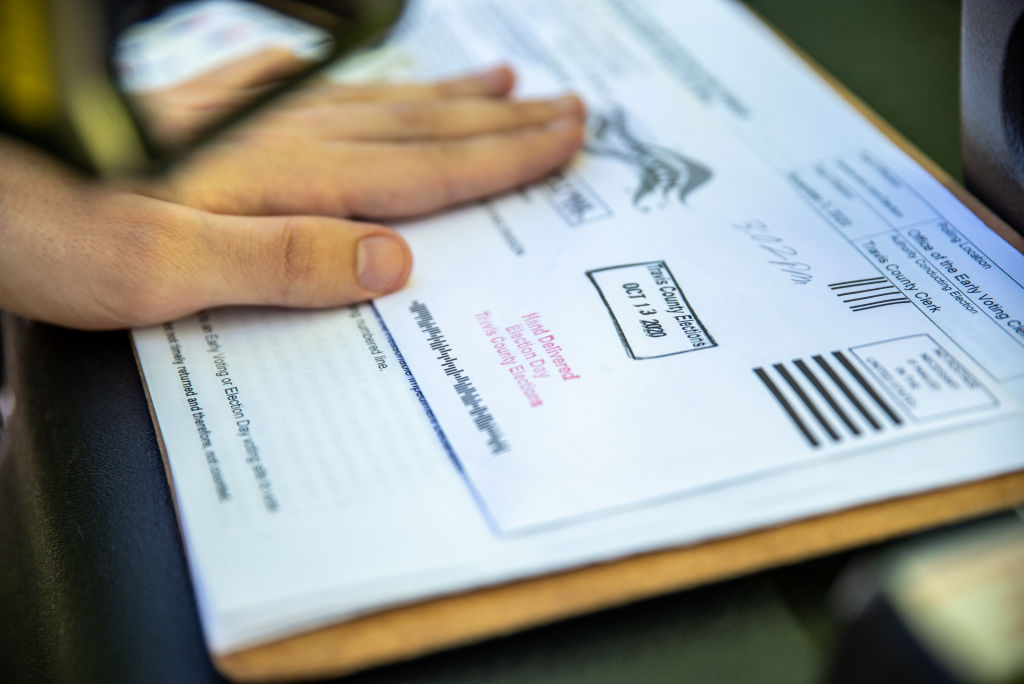Texas doesn't need to tell mail-in voters their ballot was rejected until after the election, appellate court rules


A free daily email with the biggest news stories of the day – and the best features from TheWeek.com
You are now subscribed
Your newsletter sign-up was successful
A three-judge panel of the U.S. 5th Circuit Court of Appeals decided Monday that Texas doesn't have to inform voters that their mail-in ballots were rejected due to signature problems until after the Nov. 3 election, and need not give them a chance to correct or "cure" their ballots. U.S. District Judge Orlando Garcia ruled Sept. 8 that the current signature-verification system in Texas "plainly violates certain voters' constitutional rights" and must be either abandoned or replaced.
The 5th Circuit appellate court stayed Garcia's ruling Sept. 11, and it won't rule on the merits of the case until after the election. Under current law, Texas must inform voters that their ballot was rejected within 10 days after the election. "The state election code does not establish any standards for signature review, which is conducted by local election officials who seldom have training in signature verification," The Texas Tribune reports. Counties can choose to inform voters before the election and give them a chance to cure their ballot.
Texas already limits mail-in voting to people with disabilities, seniors 65 and older, and voters outside of the country or in jail during an election. "Texas' strong interest in safeguarding the integrity of its elections from voter fraud far outweighs any burden the state's voting procedures place on the right to vote," Judge Jerry Smith, a Ronald Regan appointee, wrote for the three-judge panel. The conjuring judges were appointed by Reagan and President Trump.
The Week
Escape your echo chamber. Get the facts behind the news, plus analysis from multiple perspectives.

Sign up for The Week's Free Newsletters
From our morning news briefing to a weekly Good News Newsletter, get the best of The Week delivered directly to your inbox.
From our morning news briefing to a weekly Good News Newsletter, get the best of The Week delivered directly to your inbox.
Sen. John Cornyn (R-Texas), up for re-election this year, claimed voting is easy in Texas, pointing to the large numbers of Texans casting their ballots early this election. But a new study out of Northern Illinois University ranked Texas at the very bottom of its "cost-of-voting index."
"Obviously, it's not impossible to vote in Texas," but "the state has erected obstacles throughout the voting system, and when you compare the comfort and convenience of voting in Texas with other states, Texas ends up at the bottom of the list," Ross Ramsay writes at The Texas Tribune. Probably not coincidentally, he adds, "Texas has one of the lowest voter turnout rates in the country." The 5th Circuit Court of Appeals has sided with Texas in several recent cases, rejecting efforts to make voting easier, the Austin American-Statesman notes.
A free daily email with the biggest news stories of the day – and the best features from TheWeek.com
Peter has worked as a news and culture writer and editor at The Week since the site's launch in 2008. He covers politics, world affairs, religion and cultural currents. His journalism career began as a copy editor at a financial newswire and has included editorial positions at The New York Times Magazine, Facts on File, and Oregon State University.
-
 How the FCC’s ‘equal time’ rule works
How the FCC’s ‘equal time’ rule worksIn the Spotlight The law is at the heart of the Colbert-CBS conflict
-
 What is the endgame in the DHS shutdown?
What is the endgame in the DHS shutdown?Today’s Big Question Democrats want to rein in ICE’s immigration crackdown
-
 ‘Poor time management isn’t just an inconvenience’
‘Poor time management isn’t just an inconvenience’Instant Opinion Opinion, comment and editorials of the day
-
 Rubio boosts Orbán ahead of Hungary election
Rubio boosts Orbán ahead of Hungary electionSpeed Read Far-right nationalist Prime Minister Viktor Orbán is facing a tough re-election fight after many years in power
-
 Key Bangladesh election returns old guard to power
Key Bangladesh election returns old guard to powerSpeed Read The Bangladesh Nationalist Party claimed a decisive victory
-
 Epstein files topple law CEO, roil UK government
Epstein files topple law CEO, roil UK governmentSpeed Read Peter Mandelson, Britain’s former ambassador to the US, is caught up in the scandal
-
 Iran and US prepare to meet after skirmishes
Iran and US prepare to meet after skirmishesSpeed Read The incident comes amid heightened tensions in the Middle East
-
 EU and India clinch trade pact amid US tariff war
EU and India clinch trade pact amid US tariff warSpeed Read The agreement will slash tariffs on most goods over the next decade
-
 Israel retrieves final hostage’s body from Gaza
Israel retrieves final hostage’s body from GazaSpeed Read The 24-year-old police officer was killed during the initial Hamas attack
-
 China’s Xi targets top general in growing purge
China’s Xi targets top general in growing purgeSpeed Read Zhang Youxia is being investigated over ‘grave violations’ of the law
-
 Panama and Canada are negotiating over a crucial copper mine
Panama and Canada are negotiating over a crucial copper mineIn the Spotlight Panama is set to make a final decision on the mine this summer
